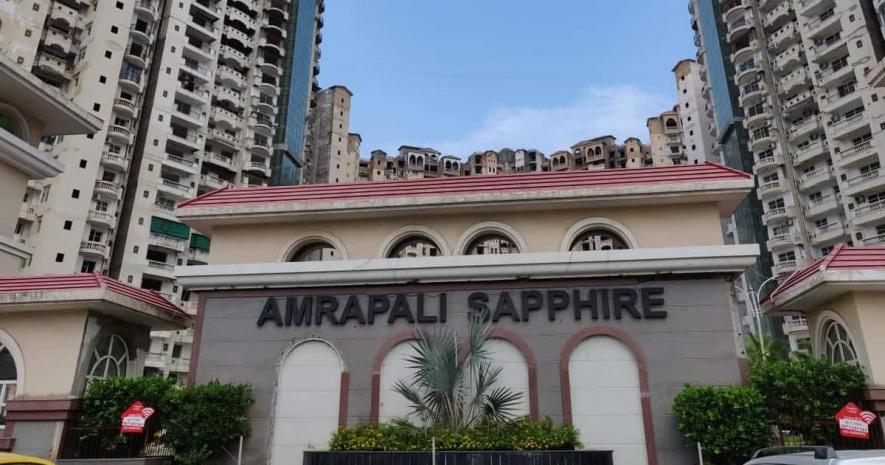Corruption in Realty Sector: Amrapali Scam Just Tip of Iceberg?

Image Courtesy: scroll.in. File Photo
In a stern warning to the officials of Noida and Greater Noida Development Authorities, the Supreme Court on Tuesday (August 13) asked the authorities to release completion certificates to the more than 42,000 home buyers of Amrapali group. The two judge bench said that the officials serving in the position of authorities for more than 10 years may land in jail if they fail to comply with the orders as the entire series of incidents unfolded with direct connivance of them.
It ordered,"You have to implement our orders or you know the repercussions. Officers who are there for last ten years are in trouble. We don't want to say much but we know what has happened there. At least 20% of such employees will be in trouble. If our orders are not complied with, the concerned officials will be sent to jail."
The apex court's consistent wrath with the Amrapali builders and regulating authorities emanate from a long legal battle of home buyers coupled with consistent flouting of existing norms by the stakeholders, allegedly including regulating authorities and banks.
Also read: SC Verdict: Relief to Homebuyers in Amrapali Scam Case
NewsClick had earlier reported that the builders had allegedly flouted rules and diverted advanced money of home buyers towards personal expenses even to the extent of building personal properties for the promoters and directors. A report of the forensic auditors showed that the money was swindled away to pay the directors’ fee. Reportedly, the directors were also withdrawing salaries. Under Indian Income Tax rules, a person cannot draw salary and consultancy from the same company at the same time.
For example, Anil Sharma, the promoter of the company reportedly withdrew Rs 29,13,23,580 as professional fee whereas another Shiv Priya withdrew Rs 26,43,64, 571 for his services. But what is more astonishing is the fact that the money was allegedly also diverted for buying luxury cars, gold bars and even expensive marble for bathrooms. Further, the company allegedly diverted over Rs 38 lakh for bathroom products, Rs 19 lakh for watches and Rs 74 lakh for furniture.
Amrapali: Tip of the iceberg
A closer observation of the judgement pronounced by the apex court also leads us to the crisis of realty sector which has been riddled with corruption involving big money. Presently, many builders are staring at the upcoming judgments of the top court on future course of action for pending and partially built 2.6 lakh flats. Remember, the figure applies for Greater Noida alone. The actual figure for other areas of the country may land up in several lakh residential and commercial units.
Besides Amrapali, the apex court has also cancelled the Realty Estate (Regulation and Development) Act (RERA) certificate of the Unitech Group, a Forbes Global 2000 company, for failing to deliver almost 16,000 homebuyers their flats. Similarly, Omaxe, Supertech and Lotus Projects promoted by 3C Group, Unnati Fortune Holding Ltd, and Logix Group are awaiting completion.
So, the question which still remains unanswered; how did this entire episode unfold? The hint to this question again leads us to the Supreme Court judgement which stated, "Amrapali Group started its operations in the year 2003 in Delhi. It was started by Mr. Madan Mohan Sharma who managed it for a brief period. Thereafter, the operations of the Group were managed by his son Mr. Anil Sharma."
The same period was also characterised by the reforms in the lending of home loans by several banks. So, if a private builder wanted to started a project, they must have some private investment for buying land. The private investors invested money as they were to get the residential and commercial units at below market rates. This was accompanied by the home buyers money. The entire formula was known as 20: 80 formula in which buyers were required to pay 20% as the booking amount and rest of the amount at the time of possession. In other words, 80% contribution came in form of bank loans.
Also read: SC Cancels Amrapali Group's Registration and Leases
The formula worked well for the initial period but the bubble soon burst as the banks kept granting loans but did not check if builders were really delivering the promised homes. The problem took deeper roots when Sharma [it applies to other builders too] allegedly not only bought large tracts of land with active political backing but also swindled money through famous private investment firm J P Morgan. Sharma also tried twice to get elected to the Parliament, one time for Lok Sabha and the next time for Rajya Sabha.
Besides this, the real estate sector too saw faced slow downs. After the global economic crisis of 2008, the sector witnessed freezing of cash flow around the world and it was manifested in new projects too. An analysis by the Centre For Monitoring of Indian Economy (CMIE) suggests that the launches of commercial property projects have steadily declined. The second major blow came in the form of demonetisation which froze the money to be parked in the projects. Home buyers expected that the advent of Real Estate Regularising Authority could improve things but perhaps it's already too late to clear the mess.
Get the latest reports & analysis with people's perspective on Protests, movements & deep analytical videos, discussions of the current affairs in your Telegram app. Subscribe to NewsClick's Telegram channel & get Real-Time updates on stories, as they get published on our website.
























